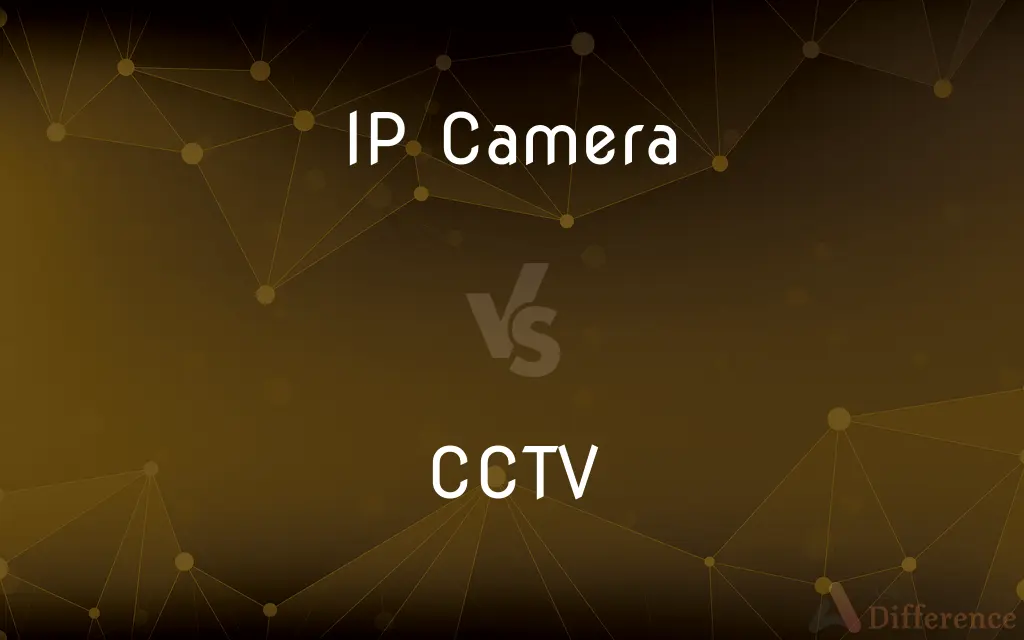IP Camera vs. CCTV — What's the Difference?
By Tayyaba Rehman — Published on November 25, 2023
IP Camera is a digital camera that sends and receives data over the internet, while CCTV (Closed-Circuit Television) is a system that uses analog cameras to transmit video to a specific set of monitors.

Difference Between IP Camera and CCTV
Table of Contents
ADVERTISEMENT
Key Differences
IP Camera and CCTV both serve surveillance purposes but have distinct technological foundations. An IP Camera is essentially a digital device, transmitting video over a network, allowing for remote access and management. Conversely, CCTV primarily employs analog video cameras, transmitting their feed to a specific set of monitors using coaxial cables.
When considering connectivity and transmission, the IP Camera has a notable edge. As it operates over the internet, users can access the live feed remotely from anywhere, as long as they have an internet connection. CCTV, being more traditional, doesn't inherently offer remote access. To view the feed, one usually has to be at the specific monitor connected to the system.
In terms of image quality, IP Cameras often deliver higher resolution and clearer video, thanks to their digital nature. CCTVs, being analog, may have limitations in delivering high-definition video. This makes IP Cameras particularly suitable for areas requiring intricate details, like facial recognition.
Storage solutions for these systems differ as well. IP Cameras usually store data in digital format, either on cloud servers or network video recorders (NVRs). CCTVs typically rely on digital video recorders (DVRs) to store their analog video feeds.
Comparison Chart
Nature
Digital
Analog
ADVERTISEMENT
Transmission
Over the internet/network
Via coaxial cables
Image Quality
Typically high resolution
Often standard resolution
Storage
Cloud servers or NVRs
DVRs
Remote Access
Generally accessible from anywhere with internet
Limited or requires additional setup
Compare with Definitions
IP Camera
A camera providing digital video over a network.
The security team utilizes IP Cameras for high-definition surveillance.
CCTV
Monitoring system transmitting to specific monitors.
The CCTV feeds are continuously monitored by the security team.
IP Camera
Camera allowing for network-based viewing and recording.
With the IP Camera, the homeowner could monitor his property while on vacation.
CCTV
A surveillance system using analog cameras.
The mall's security relies on a comprehensive CCTV network.
IP Camera
A camera with integrated network connectivity.
Businesses are shifting towards IP Camera solutions for their scalability.
CCTV
Closed system without broadcast to the public.
Confidential locations use CCTV to ensure privacy.
IP Camera
A digital camera sending data over the internet.
The store installed an IP Camera for remote surveillance.
CCTV
Traditional surveillance method using coaxial cables.
Many older establishments still prefer CCTV setups for their simplicity.
IP Camera
Surveillance device accessible via internet protocols.
The new IP Camera offers clearer footage and cloud storage.
CCTV
A video system where content is privately monitored.
The factory installed a CCTV system to oversee production lines.
Common Curiosities
Can IP Cameras work without the internet?
While IP Cameras transmit over the internet, many can still record locally without an active connection.
Can CCTV systems be accessed remotely?
Traditional CCTVs don't offer remote access, but modern systems can integrate this feature.
How are IP Cameras powered?
Many IP Cameras use Power over Ethernet (PoE), allowing power and data transmission over the same cable.
Which offers better video quality, IP Camera or CCTV?
Typically, IP Cameras offer higher resolution and clearer video compared to traditional CCTVs.
Do all IP Cameras offer cloud storage?
Not all, but many modern IP Cameras have cloud storage options.
Can IP Cameras integrate with other smart devices?
Many modern IP Cameras can integrate with smart home systems.
Is CCTV the same as security cameras?
While all CCTVs are security cameras, not all security cameras are CCTVs. Some might be IP Cameras.
How secure are IP Cameras from hacking?
Security varies by model, but it's essential to use strong passwords and update firmware.
How is data encrypted on IP Cameras?
Most modern IP Cameras support data encryption protocols to ensure secure transmission.
What's the range of a typical CCTV camera?
Range varies, but many can cover areas within 20 to 70 feet.
Are CCTVs susceptible to interference?
Analog CCTVs can experience interference, but it's less common with digital systems.
What maintenance do CCTVs require?
Regular cleaning of lenses and checking cables for wear is typical maintenance for CCTVs.
How long do CCTV systems store footage?
It depends on storage capacity, but typical DVRs might store 30-90 days of footage.
Can IP Cameras be used outdoors?
Many IP Cameras are designed for outdoor use and are weather-resistant.
Can CCTVs work in the dark?
Many CCTVs come with infrared capabilities, allowing them to work in low light or dark conditions.
Share Your Discovery

Previous Comparison
My Friend vs. Friend of Mine
Next Comparison
Body Mist vs. PerfumeAuthor Spotlight
Written by
Tayyaba RehmanTayyaba Rehman is a distinguished writer, currently serving as a primary contributor to askdifference.com. As a researcher in semantics and etymology, Tayyaba's passion for the complexity of languages and their distinctions has found a perfect home on the platform. Tayyaba delves into the intricacies of language, distinguishing between commonly confused words and phrases, thereby providing clarity for readers worldwide.
















































